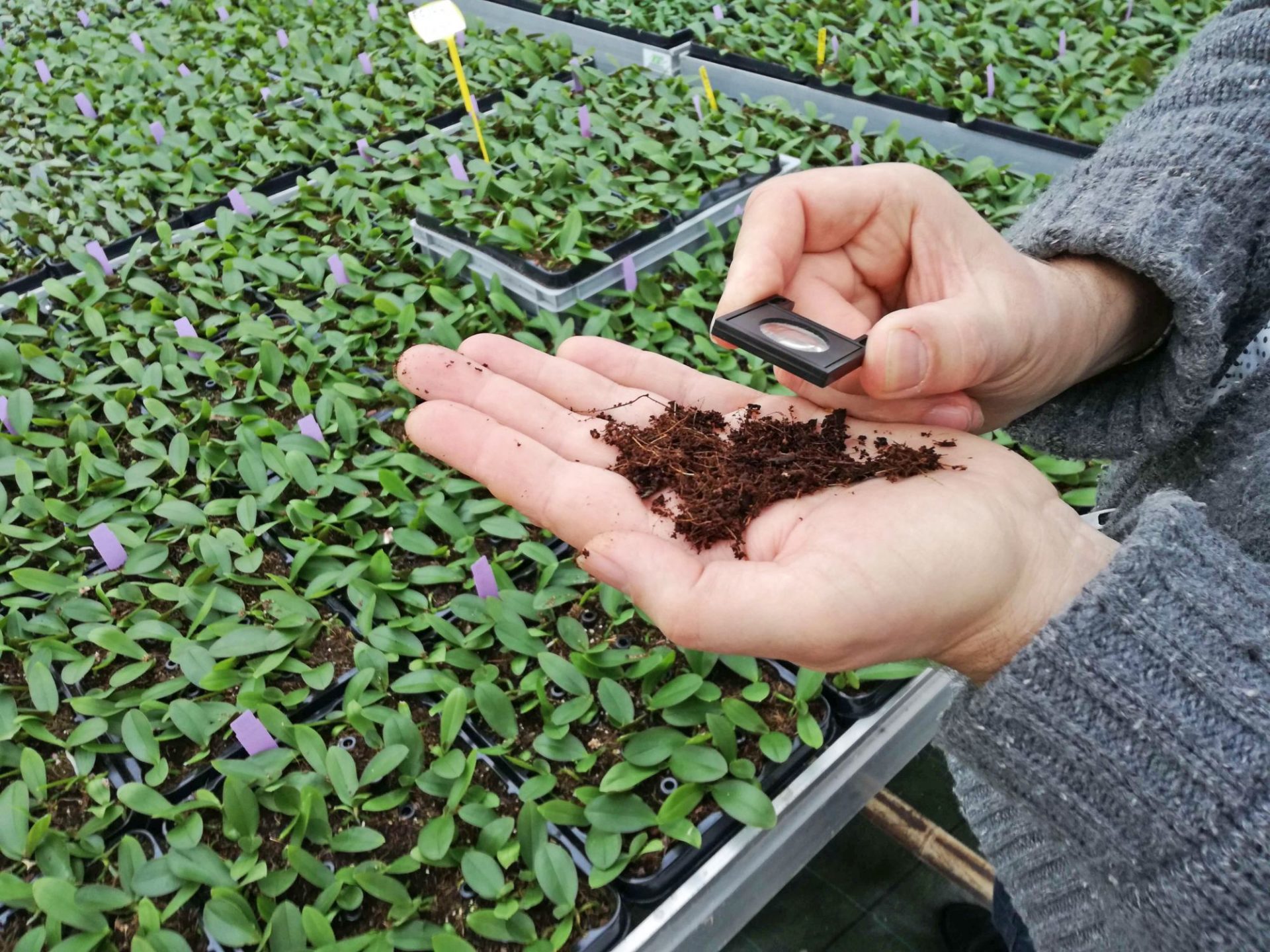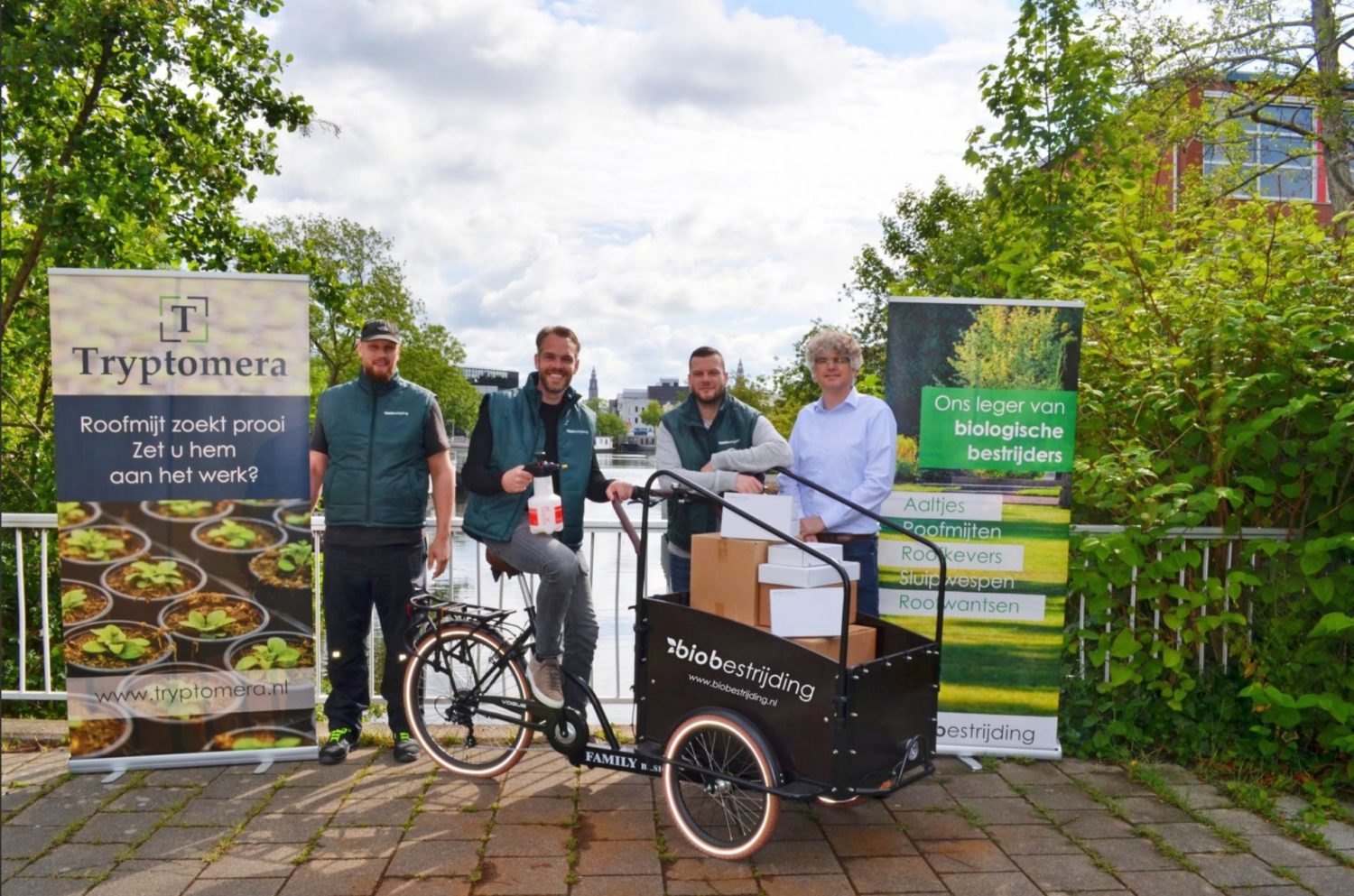Pest insects. Just the thought makes many a grower shiver with misery. After all, they do damage quite often and can even completely destroy crops. How do you fight them organically? Simple, by using their natural enemies. Predatory mites, for example. In Groningen they are grown and sold on a large scale by Tryptomera. A growth market, it turns out.
Stratiolaelaps scimitus is its name, also known as Hypoaspis miles. Or in Dutch: een bodemroofmijt. A minuscule light brown-beige creature, a kind of mini spider of 1 mm in size, which feels at home in moist soil and can move quickly in it. It is a real glutton and a natural enemy of various pests, including thrips and blood lice. 'Not surprisingly, predatory mites are frequently used for biological control of these unwanted insects,' says Hans Bruining. 'Especially in greenhouse horticulture and with large ornamental flower growers, such as orchid and chrysanthemum growers.' Hans is general business manager of Tryptomera, a Groningen-based company whose activities include the breeding and sale of predatory mites for the business market. Every week, millions of bugs find their way from the premises on Admiraal de Ruyterlaan to professional growers all over the country.
Complex process
Tryptomera stems from Citeq BV, a biotech company also based in Groningen, which was founded in the 1980s by Kees van der Graaf and Betty Goedewaagen. In recent decades, Citeq BV has become a leading producer of, in particular, house dust mite raw materials for the pharmaceutical industry. From that knowledge and a rapidly increasing demand for biological pesticides, it was decided some time ago to set up its own cultivation of predatory mites under the name Tryptomera. A complex process, to be sure. 'The breeding of predatory mites listens very closely,' Hans emphasizes.
'Effective pest control requires predatory mites bred under the right climatic conditions. That means you have to keep a close eye on temperature and humidity at all times. As well as the nutrition you give the predatory mites. Keeping such an animal alive is one thing, but to ensure that a population grows, there is quite a lot involved.'

Webshop
The business market for biological pesticides is huge and only seems to be growing. It is no different for the private market. Only until recently, the supply there was rather limited. That is why Tryptomera recently started Biobestrijding.nl, a webshop aimed primarily at private individuals that sells not only predatory mites but also other biological pesticides such as ichneumon wasps, nematodes and ladybugs. 'Virtually every beneficial insect you can think of is available, including by-products such as soil improvers and birdhouses,' says marketing managerRaymond Tel. 'The webshop is also running extremely well. Especially during the corona crisis, when people were busy in the garden en masse. We started both parts of Tryptomera at the right time. Whether for business or private customers, the need for a transition from chemical to biological pesticides is becoming more widely accepted. At the same time, we are experiencing relatively warm winters these days, which brings with it many pests. So the tide is pretty much with us.'
Working Capital
Indeed, a bright future is shining for Tryptomera. Reason enough for the company to take another close look at its plans and ambitions. Where are the challenges and where do we want to go in the longer term? 'The most important challenge for the coming period is, of course, actually utilizing the opportunities for growth,' says Hans. 'This requires additional working capital. In addition, in the near future we want to grow other types of beneficial insects in addition to soil predators. We therefore started looking for a partner who could support us not only in the first step, but also in the second. That search eventually brought us to NOM. I knew the organization from my background at Rabobank. We had already worked together a few times in the past in a pleasant way. Moreover, the owner Kees van der Graaf and NOM are not strangers to each other either.'
Excellent step
What followed was a careful investigation by Klaas Kooistra, Investment Manager of the NOM. He studied the business plan and had several conversations with those directly involved and nurseries. Klaas was impressed by the market potential and decided to provide the company with funding. 'The market for biological pesticides is a huge growth market,' he emphasizes.
'Currently, that market is dominated by two major players. Discussions with nurseries clearly showed that there is a great need for several strong players. That's where Tryptomera has great opportunities, both nationally and internationally. It does mean that the pallet of products must be expanded. In that respect, setting up the webshop Biobestrijding.nl has been an excellent step.
The webshop is not only of interest to individuals, but certainly also to business customers. Growers in particular often need other biological pest control agents in addition to predatory mites. So Biobestrijding.nl has really made the concept of Tryptomera stronger. With all the growth steps being taken, issues will undoubtedly arise. I hope we as NOM can play a role in resolving those.'
The main challenge for the coming period is, of course, to actually take advantage of growth opportunities
Hans Bruining, Tryptomera
Force
Raymond agrees that some of the business customers now also order products through the webshop. Not only growers in greenhouse cultivation and ornamental horticulture, but also gardeners who want to control the oak processionary caterpillar, for example. 'Because Tryptomera has effective biological solutions for that too,' he says. 'Where our strength lies? First of all in the high quality of the products supplied and the personal contact. In addition, we have all the knowledge and expertise in-house to scale up production and sales. However, we do not go for the quick profit, on the contrary. We want to contribute concretely to a sustainable world. I am convinced that Tryptomera can be of great added value in the transition from chemical to biological pesticides.
